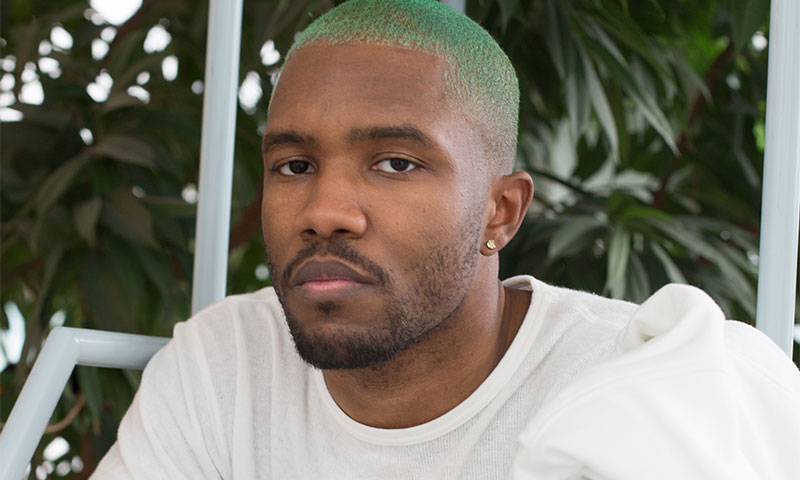
Frank Ocean is definitely an artist who does not like to be pinned down. Stylistically and personally, he has proven to be elusive and quietly outspoken, and therefore has a mystique that precedes him as a "difficult" artist and "true individual". Ocean got his start as an R&B singer closely related with the Odd Future collective, an experimental group of young LA rappers and producers who took the hip-hop underground by storm in the early part of this decade. He first gained recognition with a short EP in 2011, Nostalgia, Ultra, that gave him enough traction so as to make his debut album, 2012's Channel Orange, a record that was highly anticipated by both critics and fans alike. It delivered on people's excitement, receiving critical acclaim and gaining Ocean a heap of new fans. Though it had lots of catchy R&B hooks and beats, the album nevertheless showed off the more experimental and unconventional approach that would come to define him later. Tracks often included multiple songs that segued together, and sometimes there were conversational scenes in between songs that reminded one more of a recording of a public space than a traditional "skit" done in a studio. In between hooks were atmospheric moments that certainly were not typical of an R&B record of the times.
This balance between the approachable and "difficult" would swing sharply to the latter on his highly-anticipated, long awaited follow up, Blonde (also known as Blond). The album, which came out in August, 2016, had been hinted at being released for nearly two years. Ocean's isolation and resistance to stardom during the four years between his first and second albums was perhaps a hint at the experimental stylistic potential of the record, but the result was much more unique than anyone expected. With no straight-ahead R&B track, and with beats coming few and far between, Ocean broke all of the rules of the R&B world, with songs that were unclear as to structure, with occasional catchy parts bubbling up and suddenly fading again, a bevy of quiet songs featuring sparse guitar and/or organ, and vocals that were often pitched up to sound like Alvin and the Chipmunks. The record ends with a rough-quality tape recording of an 11-year old Ocean being interviewed by his brother. Adding to the artistic headiness of the album was that it was also preceded only one day in advance by a visual album, exclusive to Apple Music, called Endless, which featured 45 minutes of atmospheric music, with long silences, soulful interludes, snippets of beats, a minute of rap, and a long robot-voice narration, all over black and white images of multiple Frank Oceans in a loft space doing woodwork and playing instruments on loop. The album, unlike Beyoncé's video album Lemonade, was never realeased in audio format.
While Endless was technically released as his last recording for the Def Jam label, Blond(e) was completely self-released and, like Chance the Rapper's 2016 album Coloring Book, caused an uproar of anxiety in the music industry, as it showed how companies such as Apple were making such independence possible, while still allowing artists the ability to make money and reach a listening audience. (This trend has only increased since that time, with streaming services like Spotify and Apple Music now heavily factored into the Billboard chart rankings). Unlike Chance though, Ocean's release was a clear middle finger to not just the labels, but to the entire traditional industry, and his flouting of tradition continued as he refused to allow his 2016 output to be nominated for any Grammys, boycotting the awards entirely, telling NY Times music critic Jon Caramanica that "that institution certainly has nostalgic importance... It just doesn't seem to be representing very well for people who come from where I come from, and hold down what I hold down."
In his personal life, Ocean has seen controversy as well. He got legally tangled up with Chipotle for initially agreeing to do a commercial, and then backing out over some of the details, and nearly with Don Henley of The Eagles over his uncleared sampling of "Hotel California" on Nostalgic, Ultra. But the biggest thing that has put Ocean in the spotlight, besides his music, is his announcement a few years ago that his first love was a man. This was a massive event in a traditionally homophobic R&B/hip-hop world, and was the first such moment for any modern artist from that community. Happily, his announcement received nearly overwhelming public support from R&B and hip-hop artists. Still, he is often the "token" bi-sexual in that community, as evidenced only a few weeks ago when rapper Quavo (of Atlanta rap group Migos) was defending himself against allegations for homophobic comments by offering "I gotta record with Frank Ocean ("Slide", a track from producer Calvin Harris)". Still, Ocean's bravery has paid off and earned him much respect from gay and straight alike.